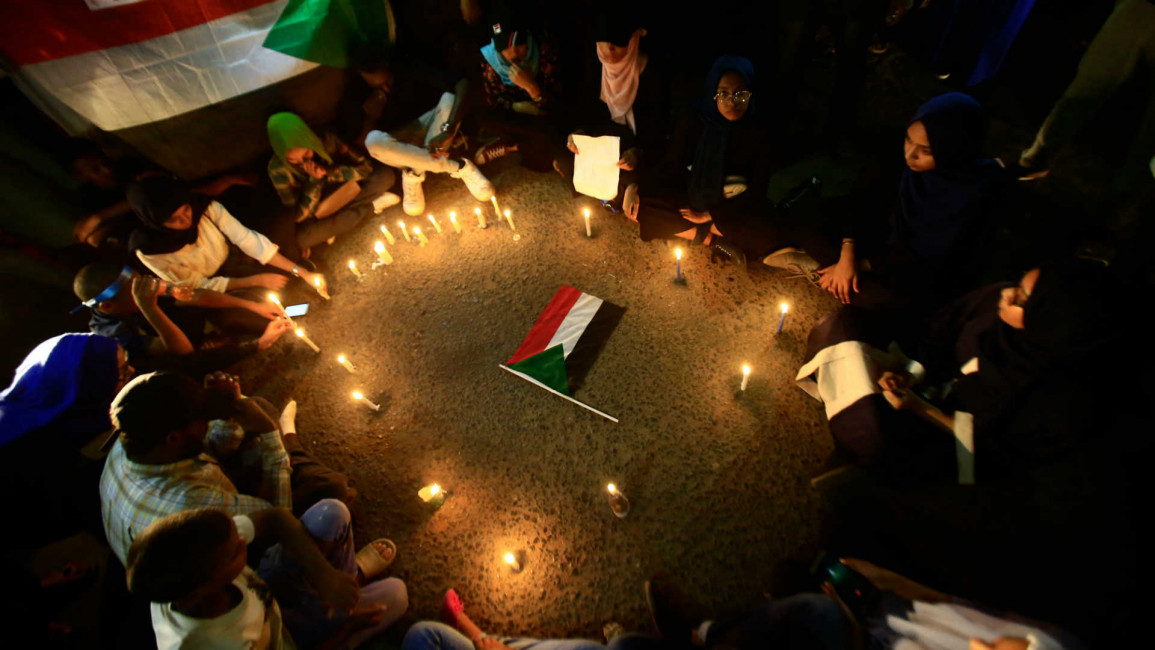Sudan's Hamdok launches fresh investigation into brutal June sit-in massacre
Sudan's Hamdok launches fresh investigation into brutal June sit-in massacre
At least 128 people were killed in the violent June dispersal of a weeks-long sit-in in the capital Khartoum.
3 min read
More than 120 protesters were killed in the massacre [AFP]
Sudanese Prime Minister Abdalla Hamdok on Sunday announced the launch of an independent investigation into the violent dispersal of a mass sit-in in June that killed more than a hundred protesters.
The 3 June massacre threatened to derail gains made by the pro-democracy demonstators since the ousting of former President Omar al-Bashir and highlighted the controversial role of the country's paramilitary forces.
Protest leaders had from the outset insisted on an independent probe in the brutal dispersal of a weeks-long sit-in in the capital Khartoum, but Sudan's leading generals forced an investigation by public prosecutors.
That investigation determined that the transitional military council - Sudan's ruling body before a landmark power-sharing deal was inked last month - had not ordered the killings, instead blaming the violence on paramilitary troops who had exceeded their orders.
Protesters also blame the paramilitary Rapid Support Forces (RSF) for leading the sit-in dispersal, but argue the troops were following the orders of their commander Mohammad Hamdan Dagalo, then the country's deputy leader and now a member of Sudan's sovereign transitional council.
Among the key aims stipulated by protest leaders for the new transitional government is to prosecute those responsible for the killing of demonstrators since protests began in December last year.
Read more: The Sudan Uprising and the critical role of social media
Hamdok on Sunday said the new investigation would aim to complete its work within six months, the Associated Press reported.
The probe will be led by a seven-member committee that includes a top judge, an independent figure and two attorneys.
Sudan's justice, defence and interior ministries will also be represented in the investigation.
While the justice ministry is headed by Nasr al-Din Abd al-Barri, a civilian nominated by protest leaders, the interior and defense ministries are headed by Idris al-Taifi and Lieutenant General Jamal Omar, both selected by the generals.
The prime minister, currently in New York for the United Nations General Assembly, added that Sudan could seek assistance from the African Union if needed.
At least 128 people were killed in the massacre, according to the pro-democracy Central Commitee for Sudanese Doctors (CCSD).
Demonstrators also allege that paramilitary troops took part in widespread looting and raped dozens of men and women at the protest site outside the military headquarters, where hundreds of thousands gathered for the first time on 6 April urging the military to stand with them against Bashir.
The mass sit-in then continued for weeks after the military took power in a coup as demonstrators urged a civilian-led transition.
The massacre temporarily halted the negotiations between the generals and protest leaders that eventually led to the ruling joint military-civilian sovereign council.
It is unclear how Hamdok's government will hold the RSF and its commander to account if the paramilitary forces are found responsible for the killings.
The RSF is an officialised offshoot of the Janjaweed militias, widely accused of war crimes and genocide in the Darfur conflict.
The paramilitary forces, led by sovereign council member Dagalo, are also accused of rights violations against civilians in Sudan's Blue Nile and South Kordofan conflict zones.
Follow us on Twitter: @The_NewArab



